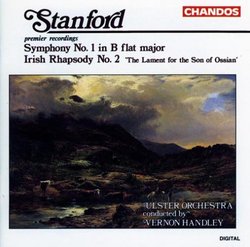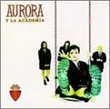| All Artists: Charles Villiers Stanford, Vernon Handley, Ulster Orchestra Title: Stanford: Symphony 1/ Irish Rhapsody Members Wishing: 0 Total Copies: 0 Label: Chandos Release Date: 10/28/1992 Genre: Classical Styles: Historical Periods, Romantic (c.1820-1910), Symphonies Number of Discs: 1 SwapaCD Credits: 1 UPC: 095115904923 |
Search - Charles Villiers Stanford, Vernon Handley, Ulster Orchestra :: Stanford: Symphony 1/ Irish Rhapsody
 | Charles Villiers Stanford, Vernon Handley, Ulster Orchestra Stanford: Symphony 1/ Irish Rhapsody Genre: Classical
|
Larger Image |
CD DetailsSimilar CDs
|
CD ReviewsAnother lost Victorian Classic Joseph E. Jalbert | Dover, NH USA | 11/17/1998 (4 out of 5 stars) "Sir Charles Villiers-Stanford is not well known today, but a century ago he was in his prime as one of the best known and most respected Irish composers of the Victorian Era. While his choral works have endured, intertwined as they are with the Church of England, his orchestral works have been heard by few. So it is with this first recording of his First Symphony. If the liner notes are to be believed, this is the piece's first recording, I paid more for it (disregarding inflation) than the composer received for it, and I have already listened to it more times than it was played in the composer's lifetime. Which is all a shame.Critics, particularly early in this century, have derided Stanford as a clone of Brahms, yet this work was created for a competition in the same years as Brahms' own First Symphony. Certainly parts of this work sound "Brahmsian," but I believe that this is more a case of common inspiration (Schumann) than mimicry. Best of the first symphony are the last two movements. The third is a lovely andante with a neat little fugue embedded. The fourth is a rollicking corker in which Stanford's own musical voice is most clearly heard, jigging, jumping and spinning through a Celtic musical landscape to a conclusion which Dvorak could have written. The included second Irish Rhapsody pays homage to Brahms "Hungarian Rhapsodies" in its beginning notes, but then follows it's own path through the folk tunes with are the hallmark of a ethnic rhapsody. I am certain that Stanford had Brahms' footsteps in sight when he wrote this piece. Stanford's First is not the best of his seven symphonies, but Handley does as good a job as he does with the others in the Chandos Stanford cycle, and I find myself listening again and again." Superb David Saemann | 06/08/2009 (5 out of 5 stars) "The British musical press was disappointed that Vernon Handley never received a knighthood. I would say he deserved it based on this disc alone. Here we have a Symphony by the 23 year old Stanford that was premiered in 1879 and was never played again until this recording session in 1991. And it is absolutely delightful. The first movement plays deftly with a lovely lyrical theme, the landler-like second movement exudes charm, while the finale is an absolute corker of orchestral display that few composers have surpassed. Handley's interpretation is absolutely superb. He seems to have the kind of soul to soul identification with Stanford that Bruno Walter had with Mahler, except that Handley never met the man and did not conduct his music for 60 years. Every dramatic turn of phrase, every swell in the orchestra is handled deftly and in fine proportion to the rest of the work. The Ulster Orchestra plays very well, although there is some scampering in string passages in the last movement. As for The Lament for the Son of Ossian, it is another neglected work receiving its first recording here. It is full of noble sentiment and brilliant massed orchestral sound that Handley gets the most out of. Helpful throughout the CD is the brilliant and full sound engineering we've come to expect from Chandos, although this example is fine even by their standards. Don't hesitate because of these pieces' obscurity--this is music that demands to be heard and, in the case of the Symphony, is absolutely delightful. Great Art does not have to be the product of great suffering."
|

 Track Listings (5) - Disc #1
Track Listings (5) - Disc #1
